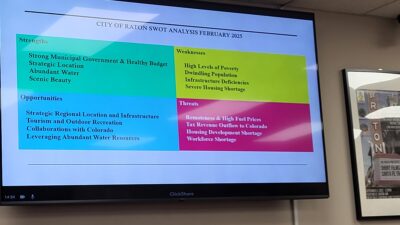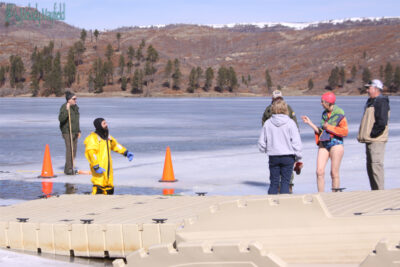by Bill Knowles TRINIDAD — A move by two Trinidad business owners put the Trinidad City Council on the defensive during a workshop meeting Tuesday, September 22. Steve Bolton and Tom Murphy made their pitch to the city council to consider using an as yet unfunded account to help Arkansas River Power Authority (ARPA) rate payers defray the high costs of electricity.
TRINIDAD — A move by two Trinidad business owners put the Trinidad City Council on the defensive during a workshop meeting Tuesday, September 22. Steve Bolton and Tom Murphy made their pitch to the city council to consider using an as yet unfunded account to help Arkansas River Power Authority (ARPA) rate payers defray the high costs of electricity.
When Murphy spoke to the council, he remarked that the presentation was being taped and would appear on a local TV broadcast, “I don’t think that the voters and utility customers really know the history of ARPA. It would behoove us…to learn the history.”
The story begins in 1979 when ARPA was formed by five or six members who began selling wholesale electricity to its customers. In 1986, ARPA became debt free.
In 2004 the City of Trinidad approved a plan calling for ARPA to change its Lamar power generation plant from a gas fired steam generator to a coal fired steam generator. The project was estimated to be completed by 2007 with an estimated price tag of $66 million.
In 2005, before any ground had been broken, ARPA asked the city for an additional $10 million on top of the original $66 million for the new project. Ground was finally broken in 2006.
ARPA returned to the City of Trinidad in 2007, asking for another $18 million raising the debt load to $94 million. Insurance, bond council, and interest for the conversion project cost another $6 million. Raton, another ARPA customer at the time, voted against the $18 million. From March to May, the debt jumped another $4 million pushing it to $104 million.
In the beginning of 2008, the plan began to fall apart as Raton sued, and the debt climbed to $110 million. By March 2008 the debt was up to $124 million. That same month, Dave Brunelli, the Trinidad City Power and Light Superintendent and ARPA Board member, advised the city, “The plant is 85 percent to 95 percent complete, keep going.” By 2009 the estimated debt for ARPA’s Lamar project was $130 million.
Finally in 2010, Brunelli advised that ARPA, “could be a problem.” Council then approved $631,541 in a pre-payment for ARPA.
Brunelli also warned of a need for a rate increase, since ARPA’s reserves had dropped to about $700,000 from $1.8 million because of a refusal by the city to approve one. At this point the debt for the ARPA power plant was at $153 million.
In January 2011, ARPA approached the City of Trinidad, asking for an additional $17 million in funding. By March, ARPA’s debt is at a staggering $173 million.
In December 2011, the ARPA power generation plant in Lamar exploded, leaving ARPA with one option: to sue Babcock & Wilcox, the Ohio boiler maker.
With a bond debt between $153 million and $173 million, less than a million in reserves, and a project that has eaten a lot of money, the Arkansas River Power Authority has yet to generate one kilowatt of electricity from its plant in Lamar.

Arkansas River Power Authority under the glass in Trinidad: part 1
More from NewsMore posts in News »




